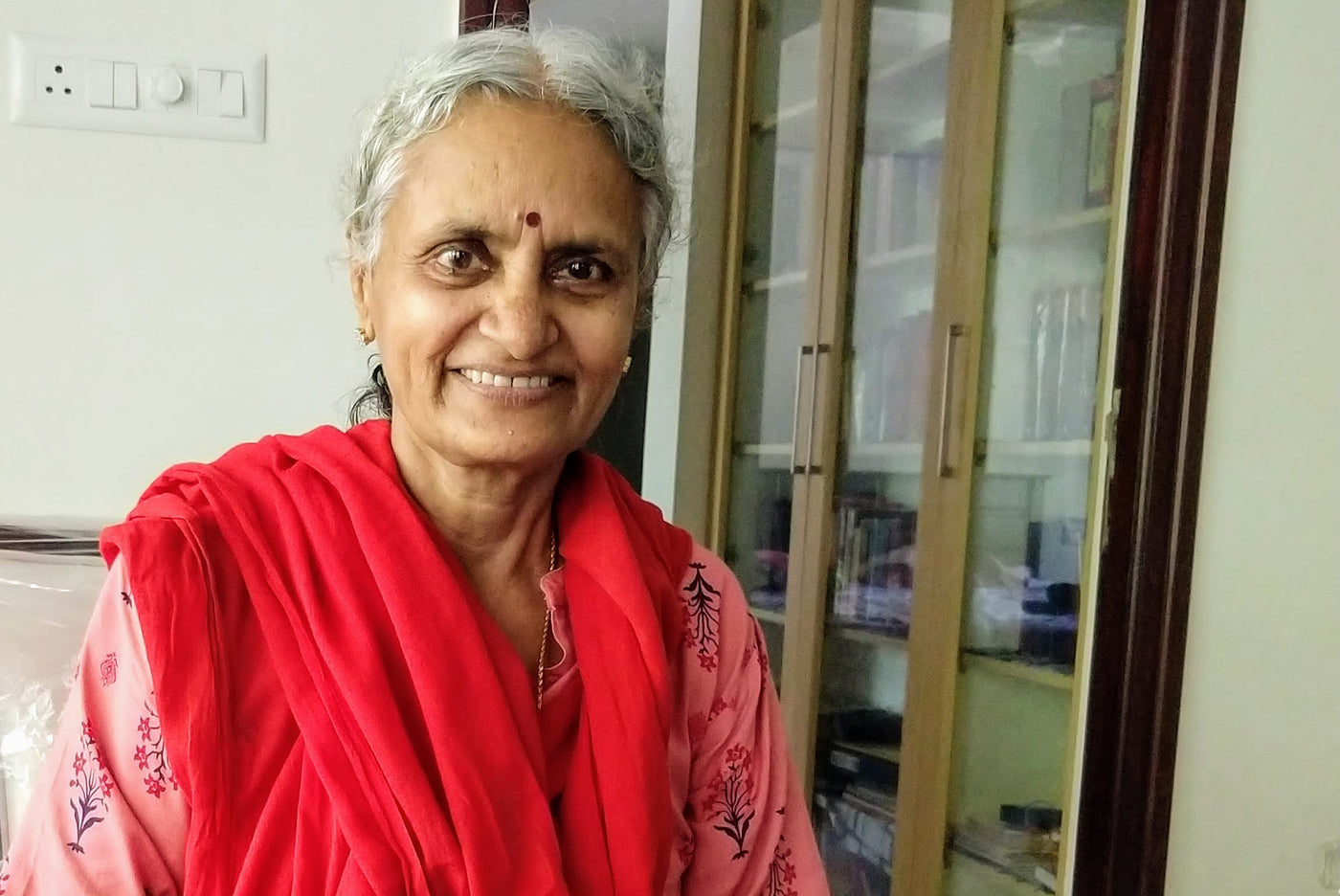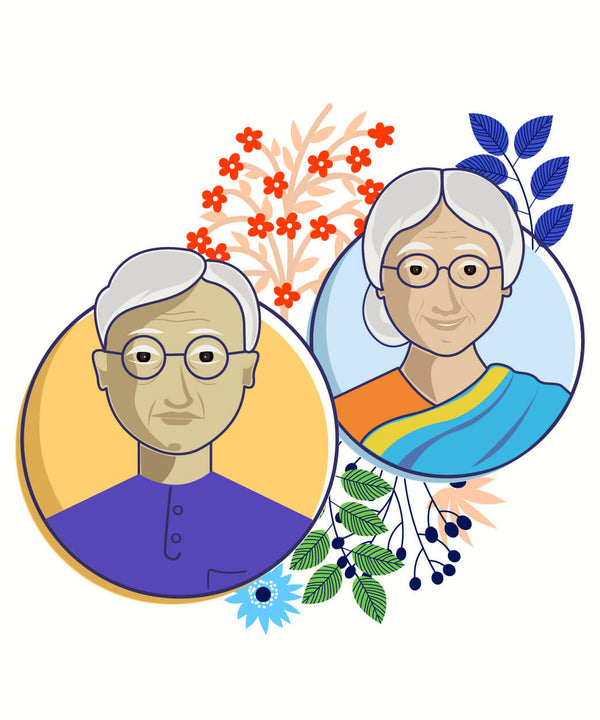
In conversation with Prayojana member Dr. Kamala Viswananthan, writer, professor, and counselor
What did you want to be when you grew up? What has your professional journey been like?
I did very well in my 10th and 12th and I wanted to become a doctor. But my father did not allow me to become a doctor because he said he would have to look for a more qualified person or doctor to marry me!! My aunt Dr Padmavathi, who is a doctor, encouraged me and without my father's knowledge I signed the application form and sent it to the university. But my father continued to refuse. I was very disappointed, and for one week, I didn't eat, did not speak to anybody, did a lot of drama, but it did not work! My father said he would get me all the qualifications for me and my sisters so that in case there is any need to work, we could. So I did B. Sc. Botany. After that, I wanted to do M.Sc. Botany because I liked the subject, but my father said ,“No, don't want my daughters to have any professional qualifications!” My professor came home and begged my father to allow me, but he said “No, if they want they can do B.Ed.” so I gave up and did that. It was the 1960s and that’s how things were then!
Once I finished, I started working, against my father's wishes! I took up teaching and I found I really liked teaching! Then I got married and came to Chennai. My Hindi was good, having lived in Bareilly, and Biology was my main subject. I took up a job in a small school, and after several years of teaching I joined Mahalakshmi School in Besant Nagar as Vice Principal and worked for close to five years there. Then I joined Sankara School where I worked for ten years.
While I was working in Sankara School, I did M.A. in Hindi. Since I had to take care of my family (two daughters and my in-laws), I took it up as a private candidate from Hindi Prachar Sabha. Financial status was such that I could not quit my job and take up studying, I had to do it while working.
With my father-in-law’s encouragement I took up a temporary position in Stella Maris College and after some initial hiccups, I worked there for sixteen years. I later did M.Phil. & Ph.D. and got a doctorate after all, just in Philosophy, not medicine!
In between my teaching positions, I took up writing Hindi grammar books, which have been published and distributed to schools. In the south, since we do not speak Hindi at home, learning is difficult since there's no one at home to help. I have tried to make it creative, so students can learn from the book themselves without help from parents. Many books were sold and have been well received.
Over the years, I taught for a total of thirty four years, during the course of which I met and taught a variety of students, many of whom still come see me! Two years before retirement, we started spoken Hindi class, which was a six-month semester course that became very popular. When I used to visit my daughters in the US, often I would run into my ex-students in airports and unexpected places, and they would tell me how useful the spoken Hindi was to them!
While I was teaching in college, we (most teachers) would have to go undergo counselling training. One of the trainers, Dr Verma told me I would make a good counsellor. I did an MS in Psychotherapy & Counselling after my retirement. I also got trained in Reiki, pranic healing so I can help more people.
My ambition is to bring happiness into the lives of people.
What was the first thing you bought with your own money?
My father was a big shot, he was a financial advisor in a company and so was earning well. But he did not let us enjoy that money. He was very strict. He taught me how to handle money, and how to spend. When I got married, my financial status was bad, but I could manage because in my house we had no servants, no gas. We were not used to luxuries; my father had taught us how to live simply.
First thing I did when I got money was to spend lavishly on my brothers and sisters. I'm the second child - I have an older sister, and a younger sister, and three younger brothers. With my first income, I bought new clothes for all in my family! I was so happy to have money. Sometimes if my father would get angry & scold someone, I would say “Come, I will buy it for you!”
Which age group did you find challenging to teach and which did you enjoy the most?
Teaching younger children is harder, as you must make them focus. To teach younger kids you need a lot of patience. In the higher classes, those who are interested, are very motivated to learn. I had a student from Germany, and she wanted to learn, so within 6 months she had picked up Hindi and could speak it so well! I enjoy teaching girls, I have two daughters, so I relate very well to them.
Other than the Hindi textbooks, you have recently written two books, could you tell us about them and the inspiration behind them?

I went to a senior citizen home in Coimbatore to visit my sambandhi. I found lots of different types of people there and interacted with many of them. The common misconception is that the people in senior citizen communities are depressed, or very religious. I found that actually many people who have missed a lot of things in life were doing all that they had missed out over there - dance, drama etc. They put up so many programs, ate together, talked and listened to each other, taught others the skills they knew. Life there is very different from what I had expected. That’s how I got the inspiration to write this book - The New Dawn.
The New Dawn - Stories of life in a Retirement Community

The other book is an autobiography, but not about my life! I wrote a book about Giri, who had Multiple Sclerosis and died at the tender age of 23.
A few years ago, I was very depressed after my husband's death. At the time, my neighbors had also recently lost their son. When they came to know I was a published author, they wanted me to write about their son Giri, who had wanted to write an autobiography. An autobiography is written about the author’s own life, so I was hesitant, but the mom was insistent that their son had wanted to write an autobiography, so I had to write in Giri’s voice. I interviewed a lot of people to understand him. I felt that there was a soul connection, and when I picked up the pen to write, words just flowed. When his mother read the book, she was so surprised. She said it was exactly like him speaking, not like I had written it, but that he had! The proceeds from the sale of this book go towards research into MS.
During the Course of my Journey - Autobiography of Giri
Who have been your role models? What about them do you admire?
Sister Shivani. She talks of unconditional love, and how to handle relationships. She says that whatever you are talking and what you are thinking should match. What you are thinking is what is reflected on the other person. If you want to change a person, you should think positive, send positive vibes. I have tried it and it really works. I really want to be like her, and have millions of people listen to me and benefit!
What’s the most important piece of advice you’d give to young girls and women today?
Have faith in your parents, believe in them, they love you so much. Respect your parents, grandparents. Always believe in yourself, you have a strength, each person has a strength. Believe in your own strength.
Always believe there is a super-power which is always helping us. Never feel guilty about anything. Whatever happens is all Divine. He has only arranged for everything. If you have so much faith in Him, then nothing can ever go wrong. Don't get disappointed with anything. Failures are the pillars of success. You have so much courage. so much strength, so you can face so much.
Always love yourself. Don’t curse yourself. If you don't love yourself, who will love you? Never feel bad about yourself or your appearance. Have faith and self-confidence. Feel good about yourself.
Relationships with everybody should be good - Don't curse people. Don't think bad about others. Forgive people, even if they have wronged you – this is very important. Don't take it to heart and grieve over it, as this will affect you more than that person. Come out of it. Put yourself in the shoes of others, then you can try to understand them better.
Unconditional love can change everybody.
By Anupama V. Sarma
Comments (2 Responses)
HARAN P.P.
Kamakshi, you are clear, forthright and very thoughtful on what you said, which clearly exhibit your empathy for the people who could not meet their problems in life. Each and every words in your advice is worth emulating and if practiced will surely result in peace of mind and better health.
My very sincere thanks to you.🙏🙏🙏
Share your Comments & Suggestions (please fill all fields below)
Comments will be approved before showing up.




02 April, 2021
S. Vijayalakshmi
The autobiography is very well written book. I agree with the author’s view that unconditional love can change lives.